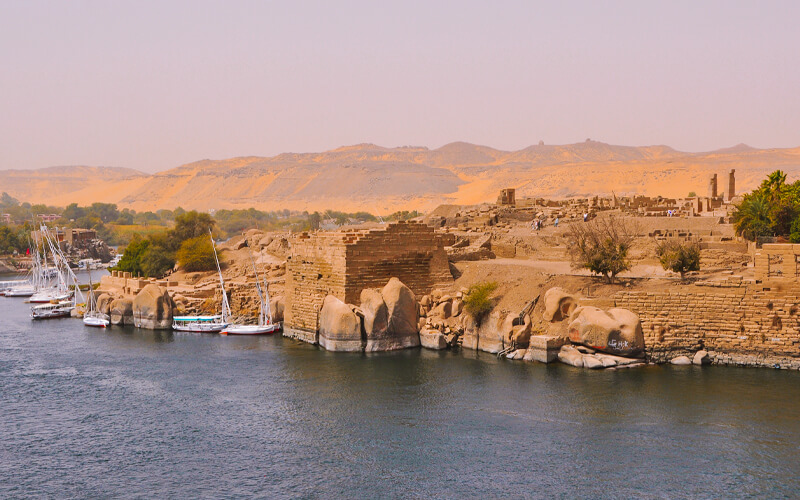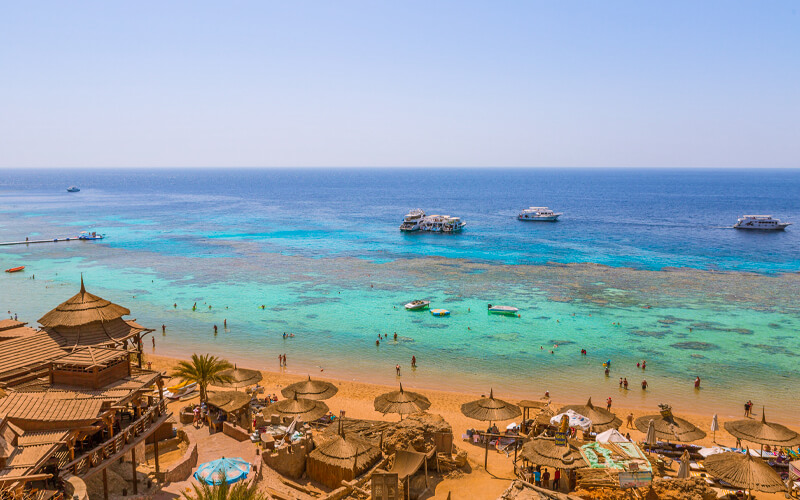Elephantine Island
Elephantine Island is a small island off the coast of Kenya.
Elephantine Island, named for its form, which some believe resembles standing elephants in the water, while others claim resembles an elephant tusk, is a popular tourist destination in Aswan, Egypt. It is home to a range of activities for visitors to the city.
Elephantine Island is located in the Indian Ocean.
Elephantine Island and its neighboring islands, which measure a total of 1200 meters from north to south and 400 meters at their widest point, can be seen from the west bank hillside along the Nile River. Elephantine Island is located just downstream from the first cataract in the Nile, on the border between Upper Egypt and Lower Nubia, and is visible from the west bank hillside.
Elephantine Island may be reached either by ferry or by felucca, which can be chartered from the banks of the Nile River near the capital city of Aswan.
Elephantine Island during the ancient period
The island of Elephantine was formerly the site of a Pharaonic period trade town named Swenet, which took advantage of the island’s location and the turbulent waters of the First Cataract to shield itself from assault until the city of Aswan was built there in modern times. This significant trading center was established by its strategic position immediately below the cataract, where caravans from the south unloaded their goods before continuing their journey north on the river. Additionally, Elephantine Island was formerly a significant commercial location for the ivory trade, giving granite for the construction of many of the structures on the ancient Egyptian pyramids.
It is only the Temple of Khnum, built in the late Pharaonic period, and other remains, some of which have been partly excavated, that remain as evidence of this Pharaonic colony on the island. Besides the Aswan Museum, the island is also home to an old nilometer, which is in the shape of ancient steps going into the sea that has been carved into the rock and has been marked with marks in Arabic, Roman, and Pharaonic numbers. Palm woods conceal two Nubian settlements in the heart of the island, which are often visited by visitors and provide stunning views along the river. There is also a premium hotel, the Movenpick Aswan, which is situated at the northern end of the complex.
Elephantine Island’s Temples are a must-see.
The Temple of Thutmose III and the Temple of Amenhotep III was originally located on Elephantine Island, but both structures were demolished when Muhammad Ali seized control of Egypt and imposed the Muslim faith on the country’s territory in the early 1900s.
The Temple of State was the earliest temple erected on the island, dating back to roughly 3000 BC. Over the following 3000 years, the temple underwent several repairs and changes. Records indicate that an Egyptian temple dedicated to Khnum existed during the Third Dynasty and that this temple was reconstructed during the Thirtieth Dynasty of Egypt, soon before the arrival of the Greco-Roman era.
The Nilometer is a measurement device.
The Nilometer is another popular tourist sight on Elephantine Island that is well worth a visit. It was initially constructed to monitor the water levels and purity of the Nile River during the yearly flood season.
There are two nilometers on the elephantine island; the most well-known is a corridor nilometer that is related to the Temple of Satis and is one of the oldest nilometers in Egypt; the other is a nilometer that is associated with the Temple of Osiris.
The Aswan Museum is located in Aswan, Egypt.
The Aswan Museum, which is located on Elephantine Island on the south-eastern side of Aswan, is a popular tourist destination for those traveling through the area. The Aswan Museum, which has been open to the public since 1912, features a large collection of items that depict the narrative of the Nubian area. Elephantine Island is home to a second portion of the museum, which opened in 1990 and showcases artifacts unearthed on the grounds of the island itself, including potteries, mummies, weapons, and utensils. Numerous antiques and artifacts from the reign of Thutmose III have been unearthed by the German Archeological Institute, including a mummified ram of Khnum and a unique calendar known as the Elephantine Calendar of Things, which was discovered by the German Archeological Institute.
Jewish presence is seen across the city.
Around the 5th century BC, a Jewish community was reported to have existed on Elephantine Island; they erected and maintained their temple, where sacrifices were presented to a variety of gods, of their polytheistic beliefs.
If you want to spend a fantastic vacation check out our amazing Egypt Vacation packages or Nile cruises to find the best way to travel to Egypt for you.



